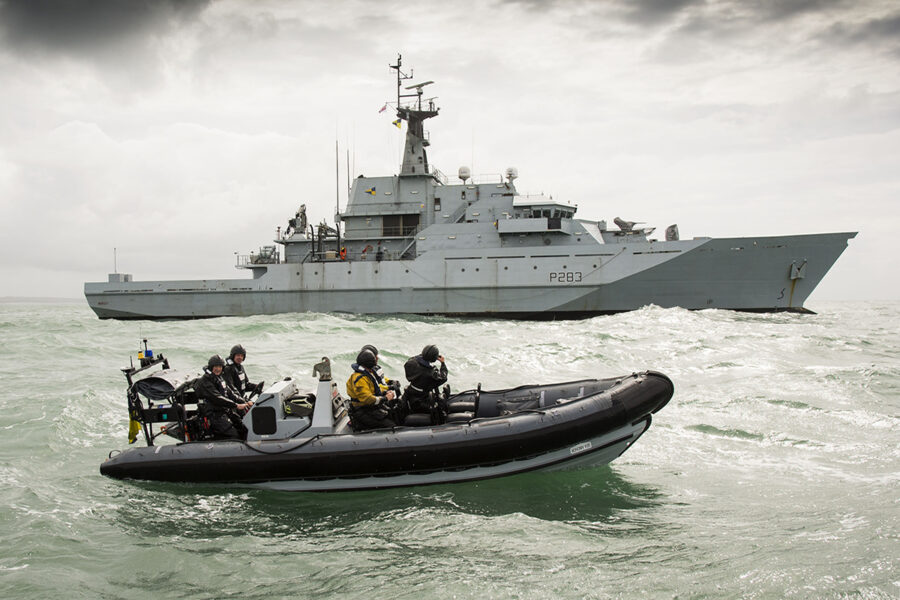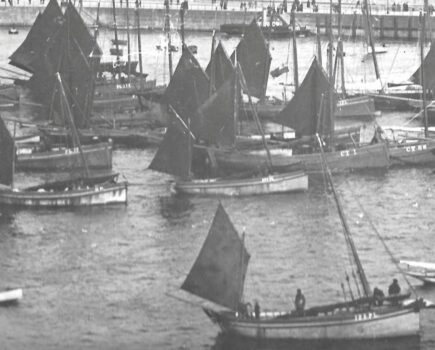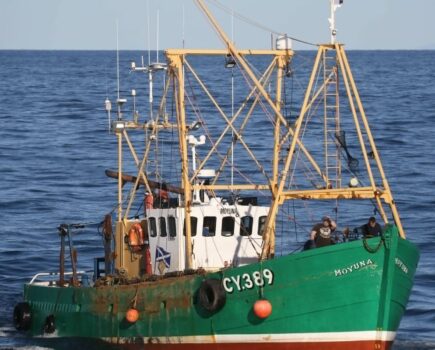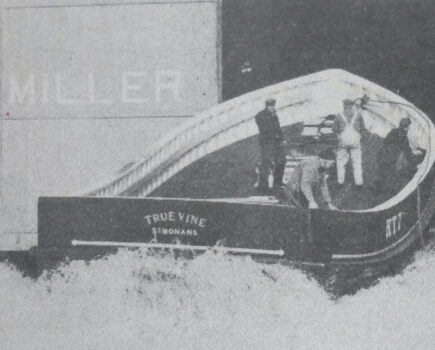HMS Mersey P 283 is the youngest of the original batch of River-Class patrol vessels that carries out fisheries protection duties in UK waters out to the median line. (John Periam reports. Photography by Geoffrey Lee)
Above: The second RN Pacific 24 RIB, the MMO Officers, and RN media on board in formation with HMS Mersey off the Sussex coastline.
Following an extensive safety briefing, two Pacific 24 RIBs left Shoreham astern to head out to HMS Mersey at the start of a day’s patrol off the Sussex Coast. This opportunity for a first-hand insight into the work of the RN fisheries protection team, in close liaison with MMO officers, was the result of extensive forward planning, particularly by Samantha Chapman – senior communications officer and Portsmouth Naval Base team leader; Lt Jo Young, RNR media operation; Lt Commander George Storton RN, and the crew of HMS Mersey, whose cooperation and support made this feature possible.
HMS Mersey was commissioned on 28 November 2003, and was built by Vosper Thornycroft. She has a displacement of 1,700t with a length of 79.5m and speed of 20 knots, giving a range of 5,500 nautical miles. The current crew compliment is between 30 and 44. It is fitted with two of the Royal Navy’s latest Pacific 24 RIBs.
Currently, there are four UK River-Class offshore patrol vessels, named Mersey, Tyne and Severn, and a sister ship HMS Clyde, which based in the Falkland Islands and is the only one currently provided with a flight deck.
Lt Commander George Storton comes from a fishing community in South Devon. His family ran a chandler’s shop, so from an early age the sea played an important role in his life. He joined the Royal Navy in 2003, during which time he qualified as a frigate navigator, working on several different class vessels.
Prior to joining Mersey in May 2016, he was Navigator on HMS Ocean, including a period as force navigator of Commander United Kingdom Maritime Forces (COMUKMARFOR). HMS Ocean led the multinational exercises as Flagship, providing Lt Commander Storton with the ideal experience for his new role on Mersey.
Lt Commander Storton described the Fishery Protection Squadron’s current role. “We work closely with the Marine Management Organisation (MMO), which contracts the Royal Navy to provide marine enforcement around the UK. We enforce legislation and offer guidance, using qualified marine enforcement officers.
“Our Squadron’s home port is Portsmouth, but we don’t spend a lot of time there. In order to be efficient and run our protection routine we visit many UK ports, so we can maximise our time on task with a watch rotation completed over two concurrent days; this allows us to complete up to 320 days a year at sea. We like to be seen by the fishing community, not only as a deterrent but also being able to meet members of the local fisheries agencies and communities – this helps us gain a proper appreciation of the areas we work in. We are an island nation, and very much need to protect our interests in coastal and surrounding waters.”
When asked about how the current fishery organisations work together, Lt Commander Storton replied, “The MMO and RN have had a working relationship for decades. That agreement is based primarily on daily communication. I regularly talk to the principle marine officers of the areas we are working in, about any relevant issues that they might want us to look in to or that may place certain areas at higher risk.
“The way we conduct marine enforcement is on a risk-based approach. First of all, we need to know the highest-risk vessels based on gear, area and history, and the MMO operations centre provides this. This data guides me to look for the right type of vessel at the right time, in order to choose the right vessel to inspect and ensure a sustainable industry is kept.”
Lt Commander Storton continued, “There are many conscientious and law-abiding fishermen out there; it is in their interest that we enforce current fishery policy. It is those fishermen that we aim to protect.
“There are some who deliberately break the rules, and there are others who don’t deliberately break the rules but aren’t sure of them. In that role, we can go onboard and offer guidance with the MMO’s support. We understand that legislation can at times be rather complex; we even have to regularly check legislation onboard with the MMO. It is important to remember that we are the contracted marine enforcement for the MMO and form the bridge between them and the working fishermen.
“Weather plays an important part and is something that the crew monitor very carefully. Mersey must find areas that give a good working environment, especially when it comes to using the two onboard RIBs.”
RIBs
“The Navy has now converted its FPVs to using the new Pacific 24 RIBs. They are a bigger RIB and better engineered, as well as being heavier. Currently, we are converting to these, so when the new type vessels being built replace this class of vessel, they will be in service and fully operational.
“They were easy to fit – although new davits were required so that we could take them, due to their increased size. They have better seating at higher speeds. Sea boat operations play such an important part in the day-to-day operations of the fishery protection squadron’s vessels. The boats are expected to put a boarding team onto a fishing vessel to conduct inspections of hauls day or night, rough or calm, in winter or summer.”
Sub Lt Williams, one of the boarding officers, confirmed the views of others – the new RIBs are the first to be fitted to the squadron’s vessels; Mersey being selected for the initial trials. “The seat layouts offer more space and are a lot more comfortable. For example, the sea state today was three and our upper limit is four. Boarding is also easier and, following our training, we are now more prepared for what we need to ask and look for. In general, we are well-received by the fishermen. We are aware it is their livelihood, and do our best to let them return to work as soon as possible.”
Lt Tristan Bell is the ship’s navigating officer. “It is nice to have a commanding officer who also shares the same navigational background. It gives me ample opportunity to use my skills in some coastal areas. When boarding, we aim to give those on the RIBs the best possible course for them to leave and return to Mersey. Our computer systems onboard play a large part in both navigating busy UK waters and finding the right vessels to consider boarding.
Leading Seaman Wenham is the chief boatswains mate and has the responsibility for the launch and recovery of the boats, preparation of the sea survival equipment and all the anchorage and towing. “We have a dedicated maintainer on board whose job it is to make sure all the survival equipment is in working order. It can be a little hairy when launching in a sea-state five. The RIBs have a top speed of 42 knots and can carry eight passengers and crew. I came on board just as we got the new boats, and we are looking forward to the new ships entering service. It is a comfortable vessel, which creates a more efficient working environment as we do spend a lot of time at sea.”
Boarding
Initially, Mersey will receive information from the MMO about a particular area and the type of vessels there – low or high-risk. The night before, and into the next morning, they will monitor their movements using the Vessel Monitoring System (VMS) run by the MMO operations room in Newcastle.
This gives Mersey more in-depth information, such as where a boat has been fishing, how long in a specific area, its history, past reports, etc, resulting in a complete picture of that vessel.
“We try to make sure we don’t board the same boats every time,” said Lt Commander Storton. “For example, if there is a boat we have boarded three times in the past year and had no issues, it will be considered low risk and we will generally try and leave them to continue fishing undisturbed. Alternatively, we may give them a call on the radio to open a line of communication in case they want to ask us anything.
“In the morning, before boarding there will be a brief by the marine enforcement officers as to which vessels they wish to board and why. Communication plays a very important part. With the introduction of electronic logbooks we can see what type of gear they are using and what a vessel has on board; this plays a vital part in our decision-making process.
“Prior to boarding we then go through a complex brief, before putting our officers into the sea boat and sending them toward a vessel. Legislation that they could encounter is taken into consideration, as well as what they might find on board and what they need to specifically look at. They will also highlight any legislation changes with those on board, just in case they are unaware of such changes.
“Prior to the RIB actually departing from Mersey, the bridge will talk to the fishing vessel via VHF, gain their details and try and build up that all-important working relationship. To save time, it is useful to find out how long they have been at sea, and when they are next going to haul their gear – sometimes it is nice to see what is in that net, and check that there are no illegal attachments affecting sustainability of fish stocks.
“This element of pre-boarding is important, as it allows us to understand the fishing vessel’s operating cycle. If we know he’s going to haul his nets soon we can be there in five minutes to observe the process and avoid delaying him. If he is just shooting, then we can wait for a while to allow him to sort his gear out.”
Fishery officer training
There is an intensive two-week training course for officers, run jointly by the MMO and Royal Navy. Legislation law takes up a lot of time, and there are role-playing scenarios on how to overcome difficult encounters. Net types and fish identification also form a large part of the course. Exams follow in abundance.
The most important test is when a boarding officer gets to sea and has to conduct a ‘sea ride’. This is practical training, which, subject to the weather, can take over a week. It involves getting the boarding officer onto lots of different types of fishing vessel, so they are able to experience working within the industry in various situations. Once the sea ride is completed, a final sign-off leads to becoming fully qualified.
“You will often find that the boarding officer will reach back to the MMO with questions. It is the norm that if there is an issue during a boarding, I will call the MMO for detailed advice. Keeping that link between the boarding team and the MMO is a key part of my role as the commanding officer, while remaining onboard the ship during fisheries protection operations.
“We are not there to cause difficult situations – we are there to protect the industry. I am not chasing statistics with the number of boardings. What I am trying to do is assess the risk that a vessel could be in breach of legislation, and enforce said legislation through thorough and accurate boardings. In an ideal world, we would see all vessels become low risk, as we conserve and manage our fish stocks.”
The word ‘communication’ comes up time after time. After every boarding, the details are logged fully for all parties involved. The final debrief is probably the most important thing they do. The problems that the industry is facing, the issues that they have, any infringements that are taking place, are all then sent back to the MMO each morning for full assessment.
Marine Management Organisation
Also onboard HMS Mersey was Simon McCusker, senior marine officer, who has been involved with the Royal Navy training for the past seven years.
“What Commander Storton has said is very valid. The sharing of intelligence is the key to our success. I am very much involved in seeing that our shore-based training is continued at sea, and I pay regular visits to the squadron’s vessels. I have with me today Daisy May, the principal marine officer for the MMO’s South West region. I am helping him with his transition to his new post in the MMO, and this trip on Mersey is all part of it.
“Communication is now better than it was four years ago – it is a lot more joined up, and we are using these assets, including those discussed earlier, linked to the protection of the UK Coastline. By having these links, it is giving us a much larger fleet, offering a much better capability. Now included is the addition of a special box on the report forms after an inspection, where the skipper of a vessel can add their own comments. This helps the operations room.
“We must not forget the good work the region’s IFCAs do, especially with the inshore fishing fleets.”
Regional issues
In the weeks preceding this trip, Fishing News had twice reported concerns expressed by local skippers regarding allegations of French trawlers targeting bass off the Isle of Wight. The Royal Navy was aware of this situation and before this trip, Lt Commander Storton briefed the concerns that have been raised with his boarding team. This also came up within the region’s MMO. It will be looked into and is logged as an on-going situation.
Some issues have been raised with regard to the reliability of mesh size measurements. All gauges used are calibrated and sent away for checks, to ensure that they are working to an agreed standard. On Mersey they are checked every day before any boarding.
“I cannot stress enough the key role that communication plays. All the squadron’s vessels are kept fully up to date of any regional issues. We recently worked with the Maritime Coastguard Agency (MCA) Communications Centre at Fareham, where we assisted with a medical emergency after a gas cylinder exploded, injuring a fisherman,” said Lt Commander Storton.
The new FP fleet
Batch two of the River-Class, under the national ship building strategy, is currently in production. The first one, HMS Forth, is now in the water and will shortly begin sea trials. It will be followed by HMS’ Trent, Medway, Tamar and Spey. Being slightly larger, these will have an on-board flight deck, and all will be fitted with the new RIBs as well as the latest communication systems.
Their role will continue to expand the squadron’s work within the Joint Maritime Operation Centre. There will be more interaction with the UK Border Force, the police, the Maritime Coastguard Agency, as well as the MMO and other parties.
Lt Commander Storton said, “With HMS Mersey doing 320 days a year at sea, we see a lot happening around our coastline. For example, we know what is going on from a ferry crossing to a localised yacht race. By spending so much time at sea, patrolling our waters, we can understand the difference between what is normal and what is not normal. This helps protect the interests of our maritime nation.”
There is to be a new fisheries protection squadron commander. Lt Commander Sarah Oakley, who was in command of HMS Mersey when Fishing News was last aboard (Fishing News, 5 October, 2012) has now been promoted to Commander. She has seen first-hand operational roles from the UK to the Falklands and her interest in the fishing industry has remained. Her wealth of experience will be ideal as the new fleet vessels are commissioned.
Read more features from Fishing News here.








